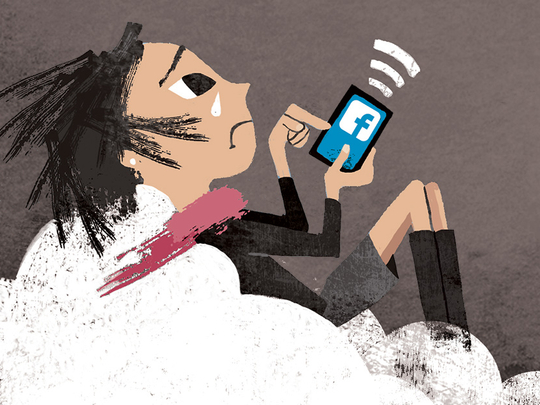
It turns out that staying away from Facebook for a bit could be good for you. Known by anyone who is actually honest with themselves, that piece of obviousness is now backed up by academics: experts — boo, hiss! — from the University of Copenhagen. The publication of The Facebook Experiment: Quitting Facebook Leads to Higher Levels of Wellbeing makes it scientific fact now: social media sucks for you.
But you knew that. Facebook is, and always has been at heart, a party made up of people you don’t really like who all have better lives than you, and you’re the prat who walked through the door to hear about it. Everyone else’s holidays are more exciting than yours, their relationships happier, and their jobs way more impressive than the crap you’re dragging yourself through every day to scrape enough money together for Super Noodles. Because you can’t really cook, either. They can all cook. Oh, and by the way, they look better than you too, because they are better than you. And they’re all here at this party to talk about it.
There you are in the corner, worrying about how pathetic you are in comparison because you holidayed in Bognor again this summer with the kids, and it rained. Facebook, therefore, is an approximation of any real party you’ve ever attended during your corporeal existence on this earthly earth, except there aren’t any Twiglets.
It’s terrible. Why the hell are you at this party? It was an open invite, but you didn’t have to come. The hierarchy of attendees harmed by the simple fact of being there, according to the Facebook Experiment, runs as follows: the “heavy [partiers], passive [partiers], and [partiers] who tend to envy others” (so, not just people who went to Bognor this year and want to keep it quiet — it’s more refined than that). Those who just popped their head in for 10 minutes for a quick catch-up before heading out seem to be OK, as do the people in the centre who are walking around engaging with everyone and talking about their holidays at length — they’re fine.
The passive and the envious on the outskirts of the casual and enthusiastic Facebook reveller group: well, they aren’t doing so great. They’d do better to leave the party early, according to the research. And according to everyone else at the party as well, probably, because if this were a real gathering the latter would turn around to see a circle of people lurking in the corners of the room quietly resenting them. Had the results of this Facebook experiment been a simple Black Mirror-like assertion that technology is generally quite bad, it would be simpler.
Cold, unfeeling tech is harmful for our fragile, fleshy selves, so we should all be outside, breathing fresh mountain air, milking things, living off the land, etc. That’s already suspected — and ignored — by most hunched over a computer/tablet/phone through the waking hours: that is, all of us. And we don’t care. Which is OK actually because, y’know, Facebook probably isn’t a source of pure evil and unhappiness.
Loneliness and envy totally existed outside it already: Cro-Magnon man didn’t have higher rates of life satisfaction because he didn’t log in to check out his friends’ timeline. His levels of well-being probably weren’t wonderful either. Feelings of loneliness and envy are still common, and happen to be the bring-your-own bottled-up emotions of any shindig, online or real. If you’re the kind of person who’d walk into a gathering with feelings of “oh no, not this”, you’re likely to feel the same on Facebook. The kind of person who would compare online social networking to suffering through a crap party for an article about the Facebook Experiment, say. One of those people who signed up to Friends Reunited, back in the day, when that kind of thing was done, just to make sure everyone they went to school with was living lives as inconsequential as theirs. But enough about those people... Facebook is a place to which you bring your own insecurities, preoccupations and holiday pictures. Which makes who you are in there the same as who you are out here, even if you’re just intending to catfish.
Going in to casually mingle and chat to some friends? You’ll have a fun time. Going in to be a pain, because you’re actually a pain in real life? You’ll be poison wherever you go. Heading in feeling lonely and not ready to interact with others, full of envy for other people’s lives? As backed up by the science now, and lived experience forever — this party isn’t for you, not right now.
Take a break and go outside to seek your Twiglets and well-being elsewhere for a while. You’ll be much happier.
Guardian News & Media Ltd
Phoebe-Jane Boyd is a content editor for an online media company in Croydon who enjoys over-analysing things, comics, feminist theory, bad 80s movies, and Oxford commas.










